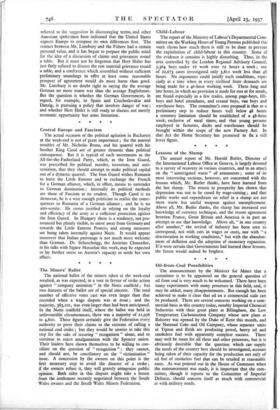Central Europe and Fascism The actual occasion of the political
agitation in Bucharest at the week-end is not of great importance ; for the marital troubles of Mr. Nicholas Brana, and his quarrel with his brother King Carol are of greater dynastic than political consequence. But it is typical of such movements as the All-for-the-Fatherland Party, which, as the Iron Guard, was prescribed for political murder, terrorism, and anti- semitism, that they should attempt to make political capital out of a dynastic quarrel. The Iron Guard wishes Rumania to leave the Little Entente and to exchange the French for a German alliance, which, in effect, means to surrender to German domination ; internally its political methods are those of Fascism at its crudest. Though Carol is no democrat, he is a wise enough politician to realise the conse- quences to Rumania of a German alliance ; and he is no anti-semite. He seems justified in relying on the loyalty and efficiency of the army as a sufficient protection against the Iron Guard. In Hungary there is a tendency, not pro- nounced but plainly visible, to move away from Germany and towards the Little Entente Powers, and strong measures are being taken internally against Nazis. It would appear moreover that Italian patronage is not much more welcome than German. Dr. Schuschnigg, the Austrian Chancellor, in his talks with Signor Mussolini this week, may be expected to lay further stress on Austria's capacity to settle her own affairs.
* * *










































 Previous page
Previous page